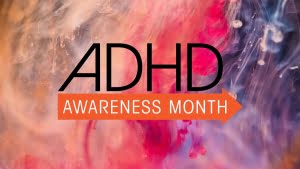 October is ADHD Awareness month. Merriam-Webster defines awareness as knowledge and understanding that something is happening or exists. Most of us can acknowledge that something is happening or exists because we can see it, feel it, smell it, hear it or taste it with at least one of our five senses. But Attention Deficit/Hyperactivity Disorder, also referred to as ADHD, is different. For those with ADHD, the diagnosis is an experience not obvious to the individual or those that they interact with.
October is ADHD Awareness month. Merriam-Webster defines awareness as knowledge and understanding that something is happening or exists. Most of us can acknowledge that something is happening or exists because we can see it, feel it, smell it, hear it or taste it with at least one of our five senses. But Attention Deficit/Hyperactivity Disorder, also referred to as ADHD, is different. For those with ADHD, the diagnosis is an experience not obvious to the individual or those that they interact with.
What is ADHD?
According to the National Institute of Mental Health, ADHD is a disorder that makes it difficult for a person to pay attention and control impulsive behaviors.
What Causes ADHD?
Specific causes have not been identified for ADHD, but research suggests that interactions between genetics, environmental factors and non-environmental factors may be contributors to the disorder.
Symptoms of ADHD
Symptoms of ADHD vary from person-to-person, but may include:
- Talking nonstop
- Fidgeting and squirming while seated
- Having trouble waiting for one’s turn
- Appearing to not listen when directly spoken to
- Frequently losing items necessary for tasks and activities
- Being easily distracted by unrelated thoughts or stimuli
Treating ADHD
Treatment for ADHD can include varying combinations of medication, individual therapy and support groups.
Did you know that ADHD is not just a childhood disorder? Although the most obvious symptom, hyperactivity, tends to be most obvious in children, adolescents and adults can also struggle with inattention, disorganization and poor impulse control. The World Health Organization has prepared a self-screening questionnaire you can use to determine if you might have adult ADHD. The Adult Self-Report Scale (ASRS) Screener will help you recognize the signs and symptoms of adult ADHD.
Disclaimer: This test is a starting point, not as a diagnostic tool. This score is not intended as a mental disorder diagnosis, or as any type of healthcare recommendation.
Where do I start?
If you believe that you or someone that you know is struggling with symptoms related to ADHD and the symptoms are negatively affecting quality of life, speak with your primary care doctor. An ADHD diagnoses has historically been stigmatizing, but ones’ ability to function is essential to daily living.
By: Chaina Porter, MHC Intern
References
Attention Deficit Disorder Association. (n.d.). ADDA. Retrieved from https://add.org/
National Institute of Mental Health . (n.d.). NIMH. Retrieved from https://www.nimh.nih.gov/health/topics/attention-deficit-hyperactivity-disorder-adhd/index.shtml
